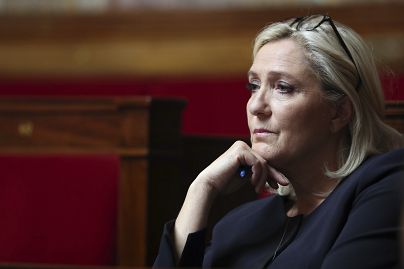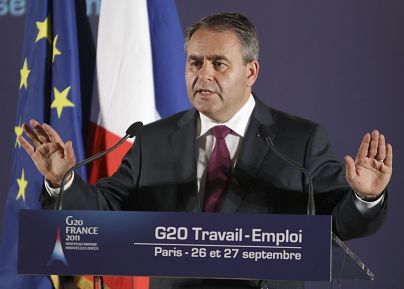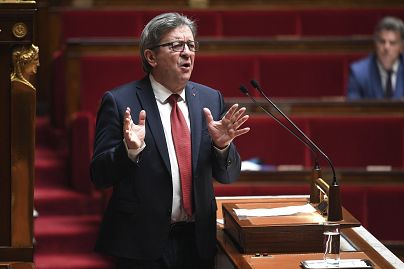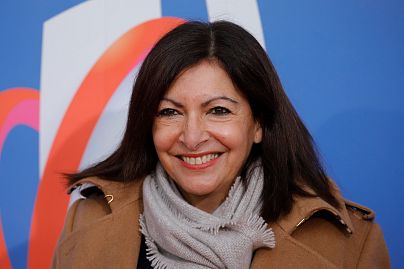With just a year until the French will head to the polls to elect a new president, those hoping to replace Emmanuel Macron are emerging from the shadows.
With just a year until the French head to the polls to elect a new president, those hoping to replace Emmanuel Macron are emerging from the shadows.
Macron, 43, swept to power in 2017 by creating his own party -- La République En Marche! -- and vowing to reshape French politics.
His term has so far been shaped by domestic issues including the months-long Gilets Jaunes (Yellow Vests) street protests, planned pension reforms and his government's handling of the COVID-19 pandemic.
He is expected to run again, experts have told Euronews, but has not yet officially joined the race.
With just 12 months before the first round of voting, only 35 per cent of French people say they trust the government's action on COVID-19 and just 45 per cent have a favourable opinion of Macron, according to two recent polls by IFOP.
Meanwhile, voting intentions for the first round would see him come second behind Marine Le Pen if the elections were held now.
Here is a closer look at those either in the running to replace Macron or widely expected to declare their candidacies soon.
Right-wing
Marine Le Pen, National Rally (RN)
The far-right politician, 52, will be hoping it's third time lucky after having run in both 2012 and 2017.
In the last election, she got through to the second round against Macron. The latest IFOP poll on voting intentions currently credits her with 28 per cent of ballots in the first round, two percentage points higher than Macron.
And while second-round forecasts crown Macron the winner, the margin between them is much narrower than the 66.1% to 43.6% thrashing she was handed four years ago.
Over the years, much has been said about her attempts to distance herself from her father Jean-Marie Le Pen and to detoxify the party she inherited from him.
She is likely to focus her campaign on criticism of a president neglecting those living in rural areas and the poorest to benefit the "winners of globalisation", according to Arnault Leclerc, professor of political sciences at the University of Nantes.
She is also expected to hone in on cultural issues such as secularism, separatism and migration and omit the economy, widely seen as one of her weakest points.
"She has been trying to soften her stance on economic issues such as leaving the euro which has disappeared from her programme," Antonio Barroso, a political risk expert at Teneo Intelligence, told Euronews.
"The other day, she said that all public debt should be paid back which is a change of view compared to what she said in the last election. And Macron defeated her in the presidential debate between the two rounds in 2017 mostly by focusing on her inability to present a coherent economic platform," he added.
Xavier Bertrand
Bertrand, 56, is the only other credible right-wing candidate to have announced his candidacy.
He used to belong to the main right-wing Les Republicains (LR) party but left following the 2017 election, criticising the leadership for not explicitly backing Macron in the second round against Le Pen.
He is currently polling third behind Macron and Le Pen with 14 per cent of voting intentions in the first round. But the IFOP poll sees him winning against Le Pen in a second-round clash if Macron fails to gather enough votes.
It is still unclear how LR will select its official candidate and whether Bertrand will choose to run under that banner. But the issue is key "because whoever the right elects could pose a huge challenge for Macron in the first round," Barroso said.
Even then, the candidate will have to walk on a tightrope.
LR suffered heavily in the 2019 European elections and although it resisted fairly well in last year's municipal election, "local anchoring does not play a role in the presidential elections," Leclerc emphasised.
"So they have to make a very difficult choice: either go to the centre to compete directly with Macron (distinguishing themselves from the National Rally will then be quite simple but will the electorate follow?); or go to a more radical right to compete with Le Pen (but the political risk of being eaten is important," he explained.
Left-wing
Jean-Luc Mélenchon, La France Insoumise (LFI)
The populist left-wing politician, 69, has also announced his candidacy for next year.
In the last presidential election, he came in fourth securing 19.5 per cent of the vote. For now, the IFOP poll credits him with 10 per cent of voting intentions in the first round.
Over the past four years, the LFI party he founded has sent lawmakers into the national and European parliaments but performed quite poorly in last year's local elections.
"Melenchon will be much closer to the spirit of Gilets Jaunes, probably talking much more about economics and trying to depict Macron as the new liberal right who doesn't care about the economic rights of the French people," Barroso explained.
For Leclerc, "the argument of infringements or threats to freedoms should play an important role" in Melenchon's campaign
He is likely to argue that "the "new world" promised by Macron has resulted in a single leader who leaves no room for anything or anyone" and that therefore "democratic life has rather regressed under Macron",
Anne Hidalgo, Socialist Party (PS)
Hidalgo, 61, is the current mayor of Paris and is the only one of the four mentioned here not to have officially declared her candidacy.
The IFOP poll credits her with 8 per cent of voting intentions in the first round.
The Socialist Party (PS) has all but been decimated over the past four years. In the 2017 presidential election, their candidate secured a measly 6.4 per cent of the vote. They then lost 250 parliamentary seats in the following legislative election to retain just 30 MPs. Their losing streak continued in 2019 when they barely managed to secure enough votes to send lawmakers to Brussels.
"The main challenge for the left is that it is highly divided and in order for Hidalgo to be a realistic challenger from the left, she would have to take away a lof of the vote from Mélenchon and as long as he runs it's very difficult for one of the candidates to basically go through to the second round," Barroso forecasted.
According to Leclerc, the PS's "only way out" would be an alliance with the Green party. The two formations presented joint lists in several municipal contests last year. Still, such a prospect appears "highly unlikely".
"Who of the ecologists or the PS will accept a relegation," he flagged.
All bets are off
The year before the French presidential elections is usually filled with plot twists that reshuffle the board so "we should be very careful about analysing the current popularity of candidates with what could happen by the end of the year," Barrosos stressed.
"One year before the (2017) election, Macron wasn't supposed to run" and the favourite to win ended up being toppled in the LR party's primary by Francois Fillon, who was in turn taken down by a fake jobs scandal, leaving the coast clear for Macron.
The same happened with Dominic Strauss-Khan, who a year before the 2012 ballot, was the clear favourite to win. But the PS politician was felled by a sexual misconduct scandal.
"If we go back further, we can almost make it a constant in the presidential elections: Rocard in 1980, Barre in 1987, Balladur in 1994 ... All were favourites one year before and ended up out of the game," Leclerc highlighted.
"An umpteenth surprise is therefore always possible," he concluded.
Every weekday at 1900 CEST, Uncovering Europe brings you a European story that goes beyond the headlines. Download the Euronews app to get an alert for this and other breaking news. It's available on Apple and Android devices.















